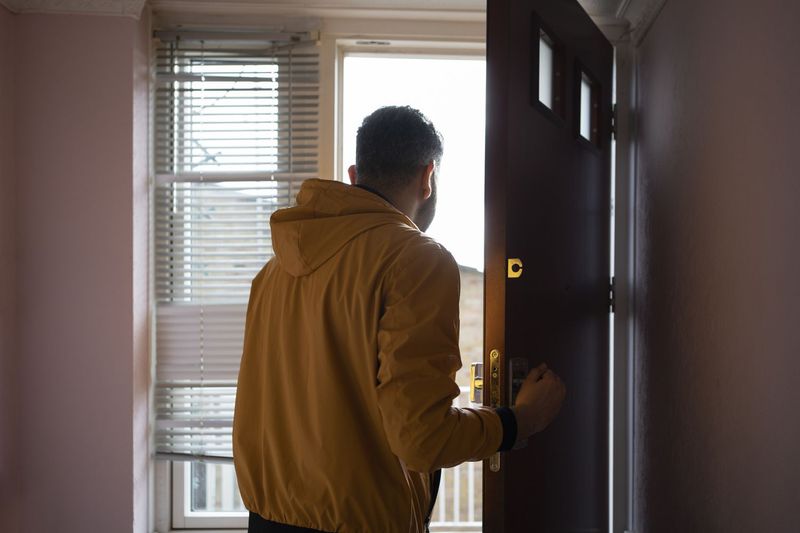Marriage Experts Share 18 Quiet Signs Your Relationship May Be in Trouble

Most marriages don’t end with a bang—they unravel quietly, thread by delicate thread. The signs aren’t always loud or dramatic; they’re subtle, almost imperceptible, hiding in everyday moments. A vanished glance, a silent dinner, a growing fondness for solitude—these are the quiet clues that something deeper may be shifting beneath the surface. Relationship experts say these small signals often speak louder than words, revealing a marriage that’s slowly, silently slipping away. If you’ve been sensing something is “off” but can’t quite name it, these 18 expert-backed cues may help you see what your heart’s been trying to tell you all along.
1. When Small Talk Disappears

Remember when you couldn’t wait to tell your partner about your day? Now the dinner table sits quiet except for requests to pass the salt. The casual conversations about nothing important have vanished.
Relationship experts consider this daily chitchat crucial – it’s the glue that keeps couples connected through life’s ordinary moments. When communication narrows to only household logistics or child-related topics, emotional distance grows.
Partners who notice this pattern might try setting aside phone-free time each day specifically for catching up. Even 15 minutes of genuine interest in each other’s daily experiences can help rebuild the communication bridge before it collapses completely.
2. Roommates, Not Lovers

Your paths barely cross except to coordinate household responsibilities. You might share an address, but emotionally, you’re living separate lives under one roof. The passionate connection that once defined your relationship has faded into a practical arrangement.
Marriage counselors see this shift frequently – partners who function efficiently as a household unit but have lost their romantic identity. You handle bills, chores, and schedules with businesslike precision, but the spark that makes you more than just roommates has dimmed.
This transition happens gradually, often without either person intentionally pulling away. Yet recognizing this pattern is crucial because relationships need both practical partnership and emotional connection to thrive long-term.
3. Emotional Indifference Takes Over

Anger requires caring. When conflicts stop because neither person feels invested enough to argue, that’s not progress – it’s surrender. The opposite of love isn’t hate; it’s indifference.
Marriage therapists worry more about couples who feel nothing than those who feel negative emotions. At least anger shows engagement! When shoulders shrug replace heated discussions, partners have often emotionally checked out.
You might notice this shift when announcements that once would have triggered excitement or disappointment now receive blank stares or casual nods. This emotional flatline signals partners have stopped counting on each other for emotional support. Their emotional investments have been withdrawn from the relationship account.
4. The Future Becomes a Solo Project

Daydreaming about retirement locations without considering your partner’s preferences? Making career decisions independently? These behaviors reveal a subtle but significant shift in how you view your future.
Healthy couples naturally include each other in their vision of tomorrow. When vacation plans, financial goals, or even weekend activities start being planned without consideration for your partner, you’ve mentally begun separating your paths.
Therapists note this often happens unconsciously. You might not realize you’ve stopped saying “we” when discussing next year’s possibilities. This mental uncoupling frequently precedes physical separation, as partners who can’t imagine a shared future rarely create one.
5. The Chill That Follows Conflict

Arguments end not with resolution but with icy silence that lingers for days. Neither partner attempts reconciliation – the fight simply dissolves into cold detachment until normal routines resume, with the underlying issue never addressed.
Relationship experts call this “stonewalling” – emotionally withdrawing instead of working through problems. Unlike healthy cooling-off periods, these frigid aftermaths become increasingly common and last longer each time.
The pattern signals partners have stopped believing in their ability to solve problems together. Rather than risking vulnerability required for true resolution, they retreat to emotional safety zones. Over time, these unresolved conflicts accumulate like toxic waste beneath the relationship’s surface, poisoning even good moments.
6. Alone Together Feels Awkward

Movie night used to mean cuddling on the couch. Now sitting beside each other feels strangely uncomfortable. You find yourselves reaching for phones or suggesting inviting friends along to buffer the strange tension.
This discomfort during one-on-one time reveals emotional distance that’s grown between you. Conversation feels forced or filled with awkward silences where easy banter once flowed naturally.
Many struggling couples schedule elaborate date nights thinking activities will fix the problem. Yet marriage counselors point out that comfort during ordinary moments matters more than special occasions. When simply existing in the same space without distractions feels uncomfortable, the relationship’s foundation has significantly eroded.
7. Physical Affection Fades Away

Morning kisses become quick pecks, then disappear entirely. Hand-holding during walks stops happening. The casual arm around shoulders while watching TV feels like a distant memory.
Physical touch creates bonding hormones that strengthen emotional connections. When it vanishes from daily life, the relationship loses a crucial maintenance system. Marriage counselors emphasize this isn’t just about intimacy – it’s about the small touches that communicate “I see you” throughout ordinary days.
Partners often don’t deliberately stop touching; the withdrawal happens gradually as emotional disconnection grows. By the time couples notice this symptom, physical contact often feels awkward or forced, requiring intentional effort to reestablish comfortable patterns of affection.
8. Feeling More Yourself Away from Them

Lunch with coworkers leaves you energized and laughing. Yet walking through your front door triggers a personality shift – you feel tense, guarded, less authentic. Your real self seems to emerge only when your partner isn’t around.
This uncomfortable contrast signals serious relationship trouble. Healthy partnerships enhance rather than diminish our sense of self. When you consistently feel freer or more relaxed away from your partner, you’ve likely developed protective emotional armor at home.
Marriage experts note this often stems from criticism or judgment that’s accumulated over time. Partners who find themselves exhaling with relief when apart should examine what aspects of themselves feel unsafe to express in the relationship. This symptom indicates the relationship no longer provides emotional safety.
9. Arguments Disappear—But So Does Caring

Friends congratulate you on how peacefully you get along now. What they don’t realize: you’ve stopped arguing because you’ve stopped investing.
Healthy relationships include disagreements because both people care enough to engage. When one partner wants to redecorate and the other doesn’t even voice an opinion, that’s not harmony – it’s detachment. Marriage counselors recognize this false peace as a serious warning sign.
The quiet household might seem like progress after stormy periods, but check whether important topics still generate emotional engagement. Partners in connected relationships care enough to disagree sometimes. When neither person feels motivated to advocate for their preferences, both have likely emotionally disengaged from building a shared future.
10. Respect Slips Away, One Eyeroll at a Time

She mentions her day, and he subtly checks his watch. He shares an idea, and her eyes roll slightly. These micro-expressions of contempt might last only seconds, but their impact cuts deep.
Relationship researcher John Gottman identifies contempt as the single greatest predictor of divorce. These seemingly minor displays of disrespect – the dismissive tone, the mocking comment, the condescending sigh – signal something profoundly damaging: you no longer view your partner as an equal worthy of consideration.
Unlike other relationship problems, contempt involves seeing your partner as beneath you rather than beside you. Partners often don’t realize how these small gestures communicate profound disrespect, making this pattern particularly toxic to emotional safety.
11. Preparing for a Life Apart—In Secret

Opening a separate bank account without discussion. Researching apartments in a different neighborhood. Building a social circle your partner isn’t part of. These actions reveal you’re already creating escape routes.
Marriage counselors note this preparation often happens subconsciously before partners consciously decide to leave. The mind starts building safety nets when it senses the relationship foundation crumbling. Even if separation isn’t your conscious plan, these behaviors signal deep relationship insecurity.
This pattern differs from healthy independence. Partners in secure relationships maintain individual interests while keeping major life decisions transparent. Secret preparations for independence indicate you’re emotionally forecasting a future without your partner – perhaps before you’ve even admitted it to yourself.
12. Turning Elsewhere in Times of Stress

Bad day at work? Instead of calling your spouse, you hit the gym alone or text a friend. Relationship experts view this pattern as particularly revealing – our instinctive responses during stress show who provides our emotional safety net.
Healthy couples naturally turn toward each other during difficulties. When you consistently seek comfort elsewhere, you’ve likely stopped viewing your partner as a reliable source of support. Perhaps past attempts at vulnerability were met with dismissal, criticism, or unwanted advice.
This disconnection creates a dangerous cycle: the less you share struggles, the less practice your partner gets at supporting you effectively. Meanwhile, emotional intimacy deteriorates as life’s significant moments get processed with others instead of together.
13. The ‘We’ Becomes ‘Me vs. You’

Conversations transform into competitions. “I loaded the dishwasher last time” replaces “How can we handle chores better?” This shift from team-oriented thinking to adversarial positioning signals serious relationship deterioration.
Marriage counselors see this pattern frequently – couples who once approached problems together now frame every interaction as a zero-sum game. Scorekeeping replaces cooperation, with each partner tracking contributions rather than working toward shared goals.
Even positive events become competitive rather than celebratory. One partner’s success triggers jealousy instead of pride. This opposition mindset often develops gradually after unresolved conflicts create the sense that partners are adversaries rather than allies navigating life together.
14. Lonelier With Them Than Without

Paradoxically, the emptiest feeling isn’t being alone – it’s sitting beside someone who feels miles away emotionally. This particular loneliness cuts deeper than actual solitude.
Relationship experts consider this sensation a serious warning sign. When presence without connection becomes more painful than absence, the relationship has lost its fundamental purpose. Partners describe feeling invisible despite being physically together.
This disconnection often manifests during moments that should create closeness – vacation dinners, weekend mornings, or evening relaxation time. The contrast between physical proximity and emotional distance creates a unique type of loneliness. Partners find themselves craving alone time not for independence but to escape the painful reminder of connection that once existed.
15. Silent Withdrawal from Shared Activities

Remember the cooking class you both loved? Now one partner always has an excuse to skip it. The weekend bike rides that were tradition? Somehow they never happen anymore.
This quiet abandonment of shared rituals happens one raincheck at a time. Unlike dramatic relationship changes, this withdrawal occurs so gradually couples often can’t pinpoint when traditions stopped. Saturday morning coffee shops, evening walks, or favorite restaurants quietly disappear from the relationship landscape.
Marriage counselors view shared activities as relationship maintenance that keeps partners connected through common experiences. When these connections are systematically dropped without replacement, emotional bonds weaken. Partners who notice this pattern might ask not just which activities have disappeared but what connection needs those activities once fulfilled.
16. Financial Secrets and Separate Lives

Hidden purchases appear on credit card statements. Separate accounts multiply without discussion. Money symbolizes trust in relationships, making financial secrecy particularly revealing of deeper problems.
Relationship experts distinguish between healthy financial independence and secretive separation. The former involves transparent agreements about individual spending freedom; the latter involves deliberate concealment. When partners start hiding financial decisions, they’ve often stopped viewing resources as truly shared.
This pattern extends beyond money to scheduling, social plans, and daily movements. Partners gradually stop consulting each other about how they spend time and resources. This separation creates parallel lives rather than intertwined ones, with decreasing overlap in day-to-day existence.
17. Contempt Creeping into Everyday Interactions

“Seriously? You’re wearing THAT?” The comment comes with a smirk that communicates volumes. Casual cruelty has become your relationship’s background music – so constant you barely notice its presence anymore.
Relationship researchers identify contempt as relationship poison. These interactions go beyond criticism to express disgust or superiority. The sarcastic comment, the mocking tone, the exaggerated sigh – each communicates the fundamental message: “I’m better than you.”
Unlike disagreements where both viewpoints receive respect, contemptuous interactions position one partner as inherently inferior. This toxic pattern often develops gradually, with small disrespects growing into habitual disdain. Partners trapped in this dynamic often don’t realize how deeply these interactions corrode their emotional connection.
18. Avoiding Home and Finding Excuses to Stay Away

Working late becomes surprisingly appealing. Weekend errands stretch for hours longer than necessary. The pattern is clear: home no longer feels like a sanctuary but a place to avoid.
Marriage counselors recognize this avoidance as a significant warning sign. When partners consistently prefer almost any environment to being home together, the relationship has lost its sense of emotional safety. The extra hour at the office, the extended grocery trip, the unnecessary errand – all create breathing room away from relationship tension.
This pattern often develops gradually, with partners not consciously admitting even to themselves that they’re stretching time away from home. Yet these small avoidances reveal the uncomfortable truth that being together has become more stressful than being apart.

Comments
Loading…